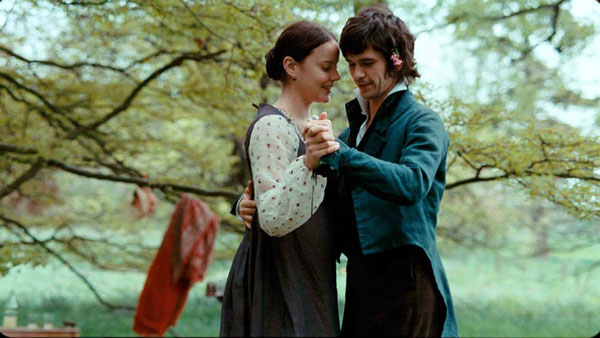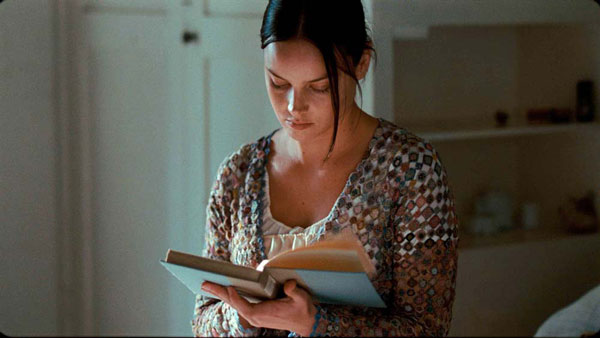“I think that I shall never see / A poem as lovely as a tree.”
American writer Joyce Kilmer penned these now ubiquitous words nearly a century after the demise of English poet John Keats. Perhaps Kilmer should have better studied the forefathers of his art. During his tragically short life, John Keats drew upon the inevitable forces of nature for poetic inspiration, crafting pieces to stand the test of time, as natural and, yes, as lovely as the seasonal chromatic changes of leaves on a tree. In her latest film “Bright Star,” visionary filmmaker Jane Campion brilliantly captures and explores the raw power behind Keats’ poetry—the mélange of love, nature, and instinct that his most prolific works would exemplify.
The aesthetic values alone provide reason enough for distinction. Cinematographer Greig Fraser offers breathtaking views of England’s natural landscape, lighting each frame with the suggestion of a heavenly aura. Scenes and locations are beautifully constructed, from the elaborate interiors of English estates, to the dank cobblestone streets of London, to the seemingly endless woodlands and marshes of the countryside. Janet Patterson’s costume work is just as exquisite, fitting with ease into the era while incorporating enough nuance to exist as an art form in its own right.

But Campion proves to be a master craftswoman in the way she combines these elements to create a rich and romantic atmosphere. Every shot in the film radiates with the utmost importance, each as crucial as the next. Campion is meticulous and supremely purposeful with her direction, constructing images that are absorbing and beautiful. A particular shot of Fanny Brawne, Keats’ great love during his final years, sitting on her bed, the window sheers before her illuminated by the sunlight and gently blowing toward her in the wind, seems destined for the history books.
The magic of this moment is owed as much to Abbie Cornish (“Stop-Loss”), who is spectacular in the role of Fanny Brawne. As we watch Fanny’s attachment to John Keats grow, Cornish offers effortless emotion. Though Fanny as a character may once or twice border on maudlin, Cornish’s performance never falters. And as the film comes to an expectedly tragic close, she is simply astounding. It would be just as tragic should her moving and brilliant work go unrecognized during awards season later this year. Oscar, take note! Ben Whishaw (“I’m Not There”) and Paul Schneider (“Elizabethtown”) are very strong as John Keats himself and Keats’ writing companion Mr. Brown, respectively. Aside Ms. Cornish, however, their efforts become afterthoughts.

Still, solid performances and captivating artistry do not completely make up for a lean narrative. “Bright Star” builds a vibrant love between John Keats and Fanny Brawne, but not much else. Dramatic conflict comes from keeping our lovers separated, a narrow objective that proves tedious at times. The devices employed for this purpose can be less than convincing, too. At one point, Keats and Brawne live under the same roof but are forbidden to interact solely at the insistence of Mr. Brown. Surely a bond as strong as theirs would withstand the burden of a simple command—but Mr. Brown proves a steadfast barrier nonetheless. The emotional aspect of these characters is just as confusing at times. Keats, Brawne, and Brown all at some point behave in a frustratingly juvenile manner, as if wrapped up in some middle-schooler’s mini scandal.
In the end, the lack of a strong central storyline is felt but not missed—not in the least. The virtue of “Bright Star” lies not in plot, but in its perceptive and penetrating depiction of love. This love builds patiently, through flirtatious tiffs and poetry readings, and then explodes, trapping your heart in its magnificent gravity. With the sincerest portrayals by Cornish and Whishaw in the delicate hands of Jane Campion, the love woven between John Keats and Fanny Brawne is beautiful, prodding, and effortless. Campion spares us no part of love’s great power; we feel the extraordinary weight of its beauty and then the devastating torture with its ultimate demise. This love floods your heart, illuminates its chambers, and then rips it out and steamrolls it. The experience is exhausting, but miraculous.
“Bright Star” showcases the raw, natural power of love, as vital as the air we breathe, as inevitable as the sunlight and the rolling landscapes of the countryside. True poetry epitomizes the intimate, ethereal connection between the human spirit and the boundless energy of our natural world. John Keats drew upon this connection in his most crucial work, and Jane Campion does so in crafting this film. “Bright Star,” then, is not just a movie: it’s poetry.
Grade: A-
“Bright Star” is presented by Apparition. The film was written and directed by Jane Campion. Also starring is Kerry Fox as Mrs. Brawne.
Runtime is 119 minutes.
Rated PG for thematic elements, some sensuality, brief language and incidental smoking.



Leave a Reply
You must be logged in to post a comment.